Graham Reid | | 11 min read

From the back row of Chicago's United Centre, about four storeys above the stage, Mick Jagger - not the biggest of men anyway - is the size of a matchstick held at arm's length.
But even without his roadmap features projected on the screen behind him, this is undeniable Mick. He struts'n'thrusts across the stage and still possesses that animal sexuality he learned from watching Tina Turner 30-something years ago.
To his left, Keith Richards is equally, if binocularly, distinctive as he crouches and plays his guitar just centimetres from the floor, chiming out the riff of their opener, Street Fighting Man.
The mature audience goes wild. The Stones are on the road again and surprisingly, given that they formed 40 years ago, they are looking and sounding like contenders once more.
It's a fair observation that, other than as a live act, the Stones haven't been relevant in rock'n'roll since the mid 70s. But right now their re-emergence couldn't be more timely. The Stones - as you are reminded when they play a ragged treatment of Happy - exist in a world where the White Stripes explore similar blues connections to those they do. And the new wave of definite-article band (the Strokes, the Hives, the Datsuns, the D4) is bringing similar frayed-edge rawk'n'roll back into the spotlight.
Tonight, with the exception of the impeccably dressed Charlie Watts on drums, the frontline Stones of Jagger, Richards and Ron Wood (dressed like a psychotic gypsy gunfighter) may look like the Strokes' grandfathers - but in rock'n'roll battledress and leather jackets they deliver a blinder of a show here in the capital of inner-city blues.
Over three nights in Boston they played 49 songs a night, only half a dozen cropping up in all three concerts. For this tour, the Stones are pulling out rarities and gems alongside the obvious.
"Throughout the years," says Richards of their changing set, "certain songs have screamed out, 'I want to go on stage!' With others it was more, 'Remember me?' And they'd get trampled. When we'd pull out one of those forgotten ones during rehearsals, I'd think, 'I can't remember this thing. It'll be a miracle if I can get through the first verse.' 
"I found if I stopped thinking about it, the fingers knew what to do. When the brain did get involved, it was to remember things like the stupid psychedelic lamp that was in the room on the winter day I wrote the song. In a way, these songs are my diary."
And judging by the response they get - the audience on its feet from the opener to the closer more than two hours later - this music has written itself into people's autobiographies. Nostalgia perhaps, but with dozens of memorable songs, excellent sound and a beer'n'dope, stadium-sized sense of anticipation and excitement.
This much history comes at a price, however. These nosebleed seats cost US$60 ($128) each. According to USA Today, scalpers have been getting more than US$1000 ($2128) for tickets for this rock'n'roll travelling circus which is selling out everywhere. 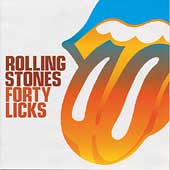
The Licks Tour - named for the tie-in double disc of hits and classic album tracks, 40 Licks - rolls through North America until February then heads for Australia and possibly the first Stones concerts in China.
On this humid, noisy night in Chicago they reach back almost 35 years for Stray Cat Blues but also throw in the new single Don't Stop, which has Jagger on guitar but classic Richards riffing all over it. It's a stadium-pleasing rallying cry for the audience, which has arrived early to buy the various tour T-shirts, expensive programme and US$6 ($13) plastic cups of beer from the in-house bars. This is rebel rock going about its capitalist business.
Crunch the numbers and you'll get the picture: the Stones' 1994 album Voodoo Lounge sold fewer than two million in the States but the back-up tour pulled in a tidy US$124 million ($264 million) - an industry threshold yet to be broken. For a stadium show such as this they'll take more than US$4 million ($8.5 million), reports USA Today.
That doesn't mean their hearts are somewhere behind the pocket calculators. These guys deliver and they know their audience.
This being Chicago - home of the blues that inspired the young Stones, and of Chess Studios (right) where they recorded 13 tracks in '64 - the music before the show includes tracks by Muddy Waters, Sonny Boy Williamson and other local blues greats. 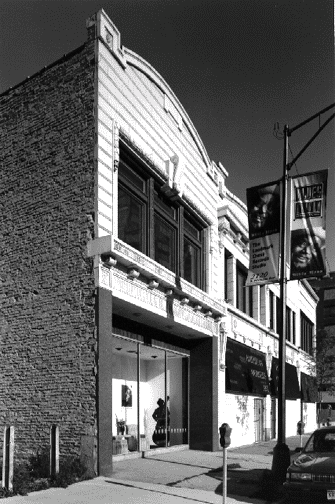
The hall steadily fills during the Pretenders, who open with a hit'n'miss set, then the lights go down, the roar goes up and on they come - but without their customary announcement, "Ladies and gentleman, the world's greatest rock'n'roll band ... the Rolling Stones."
The absence of that famous brag suggests the Stones would rather prove it than claim it as of right. And the consensus of most critics, and certainly the audience that night, is they do just that.
It is a terrific show with Richards and Wood throwing their arms around each other and laughing at various points. Richards looks delighted to be in his natural element, the usually distant Watts also grins widely.
In Boston, Richards has told of Jagger wanting to make it safe and conservative at the start of the tour but three songs into the first night Richards draped his arm around the uptight singer and said, "Hey pal, listen. For you and me, this is much easier than living at home." Jagger cracked up and everything changed.
Jagger said later: "The whole point is to have a good time. You've got to get the right combination of professionalism and this bar-band mentality."
And they do: they blast from Street Fighting Man into It's Only Rock'n'Roll and If You Can't Rock Me, and pull out unexpected songs such as All Down the Line with a four-man horn section headed by long-time Stones saxman Bobby Keys and three back-up singers. They dip into their faux-country catalogue for The Girl with the Faraway Eyes and, with the back screen showing dishevelled behaviour in New York's famous 80s club Studio 54, slash through When the Whip Comes Down.
They barely miss a defining moment - Satisfaction, Tumbling Dice and Brown Sugar are delivered with wall-shaking passion - and for Can't You Hear Me Knocking Jagger plays exceptional blues harmonica then leaves the lengthy guitar solo coda to Wood.
Richards gets his solo shot on a typically croaky-voiced, acoustic treatment of The Worst with Wood on slide, and the band (with keyboard player Chuck Leavell) move on to a small stage in the centre of the hall for a short set which opens with Muddy Waters' I'm a Man.
After half a dozen songs they quit the stage and run through the audience surrounded by a phalanx of security, then reappear on the main stage for an encore of Sympathy for the Devil and Jumping Jack Flash complete with cannons shooting paper snow across the baying crowd.
They line up for a group bow - Richards briefly misplacing himself behind a speaker to much group hilarity - then it's thank you and good night.
It has been an energetic show notable for its reach across space - the United Centre holds more than 20,000 - and time. After four decades, three of the original five Stones are still there. That's a better ratio than the Beatles, Who and Kinks, who were their contemporaries. 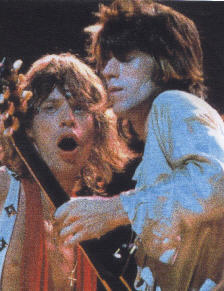
They bring a lot of history and rock'n'roll culture to a stage and Jagger, 59, has commented: "You sometimes wish the press would review the show as a show instead of doing all this pontificating about your history.
"Some of the journalists have been doing this as long as we have and they don't know what to say any more, so they add up our ages and print that. But I'm not complaining because the reviews are really good."
By changing their set every night and pulling out album favourites rather than hits, they are not only engaging themselves - the band has seldom looked happier on stage - but also appeasing and pleasing their audience.
This is the Stones, however, and Sir Michael Philip Jagger is also an astute businessman. A history lesson these shows may be, but there is that 40-track compilation - which includes four new songs - plus the Stones' 60s output (an astonishing 22 albums released between '63 and '70) is being reissued as remastered CDs next month.
These albums were a template for 60s R&B as it lurched into what became known as "rock music". Some - notably Out of Our Heads, Aftermath, Beggar's Banquet, Let It Bleed and the compilation Through the Past Darkly - are classic rock albums from a band which had a genuine, no fillers, greatest-hits album two years after their first single. The moody cover art defined the band's persona.
In the mid 60s they adopted the half-lit photograph that had been made famous on With the Beatles and threw a more threatening spin on it. Look at them pouting and sullen, spotty and smoking. These were messages for their generation. 
They were controversial, especially the liner notes to the album known as The Unstoppable Stones (or The Rolling Stones No 2) where manager Andrew Loog Oldham said if you didn't have the money to buy it, knock a blind man on his head and steal his wallet. Vicars were outraged. Few spotted the notes were written in the manner of Anthony Burgess' novel of violence and free will, A Clockwork Orange.
These days the Stones are buried in their own mystique and mythology. It's encouraging, then, that Watts - the dapper Ken Barlow of rock - gets the second loudest acclaim from the Chicago crowd after Keith "the Human Laboratory". It's a reminder that, women and drugs aside - and they are a great advertisement for the slimming properties of non-prescription pharmaceuticals - this is a band of musicians.
Their first albums were full of blues and soul covers, then Richards' association with Gram Parsons and Peter Tosh took them into country and reggae respectively. Jagger's New York gallivanting in the 80s brought in disco and dance. They almost fatally attempted psychedelic stuff on Their Satanic Majesties Request, but the Stones - as they are still proving - had blues and a rock'n'roll soul as their touchstones.
They dropped kaftan-chic and got back to basics for their career-defining Beggar's Banquet in '68, which included Street Fighting Man, Sympathy for the Devil and Stray Cat Blues. Then it was on to Exile on Main Street and Sticky Fingers.
It is the Stones of this period - a mere four years if you check the history books - that the Chicago audience best appreciates and the set errs towards.
No, they didn't say they were the world's greatest rock'n'roll band but they proved that anyone else will have a hard job claiming the title. Not bad for old guys. .jpg)
"If you carry on long enough," said Richards, 58, after Boston, "you're gonna confound your critics. The wrinkled rocker bit - so what? When you get to my age you'll get wrinkles, too. We're in this game called rock'n'roll, predicated on the fact you can't play it after you're 18 or 20. We've broken the rules again. But when didn't we?"
And maybe that, after all these years, is what rock'n'roll is still supposed to be about. With merchandising, of course.

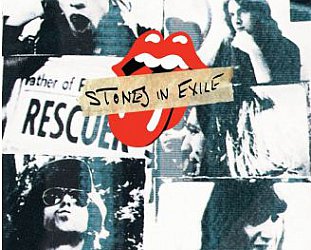
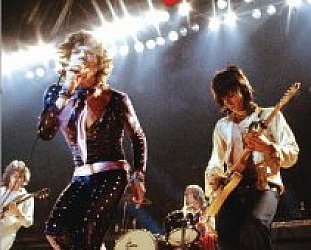
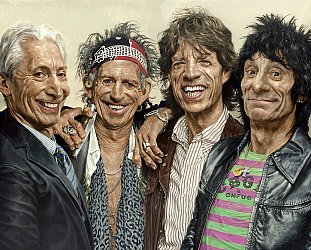
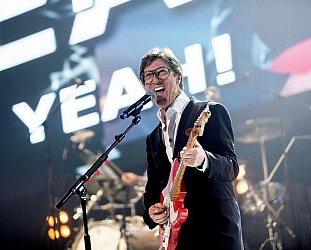

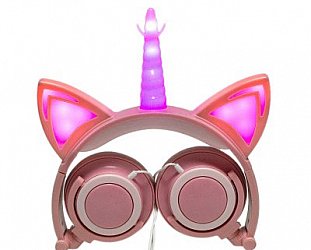
post a comment